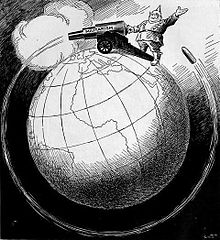Antimilitarism


The antimilitarism is the ideology that opposes militarism, the army, the armed forces as well as any other form of exercise of violence or planning of aggression by the State, considering them as instruments of oppression. The main opposition is against the existence of the army, the maximum expression of militarism, and also for the values that it generally supposedly represents and promotes such as xenophobia, sexism, homophobia, hierarchization, submission, domination, oppression, dependence and nationalism that lead to war..
Opposition to militarism, armies and war implies the defense of values such as participation, participatory democracy, mutual support and the necessary dialogue between people and societies, essential for peaceful coexistence.
Definition
Antimilitarism identifies the aspects of daily life in which militarization processes have occurred and those spaces from which militarism is promoted, to question them, reduce their capacity for influence and even make them disappear. Since militarism is the ideology that promotes military values and the influence of the military in the maximum aspects of society, politics and the economy, antimilitarism pursues the end of militarism and responds with demilitarizing proposals to the existing militarization processes.
Antimilitarism questions, therefore, the Armed Forces and armies, but also those bodies with militarized methods and manners, even if they have police functions. In fact, antimilitarist movements count as military spending not only everything related to defense, but also security forces, including civil police, since they consider that they use means similar to the military and have objectives also similar to those of the known as internal functions of armies, through which they can be a means of deterrence and repression of mobilizations and processes of social change. That is, antimilitarists consider the control exercised over society from different areas of the State, such as security forces, as another military aspect of society.
Antimilitarism vindicates horizontality in the face of hierarchical relations; equality between men and women in the face of the sexism prevailing in military structures; tolerance and respect for the different in the face of racism and xenophobia present in militarizing processes; internationalism or world citizenship versus patriotism and exaltation of nationalist values of superiority of a national identity over the rest, necessary to maintain military structures composed of people willing to use violence against nationals of another country.
Antimilitarism opposes the violence of the State against its citizens and even, in some cases, the existence of the State itself, thus showing closeness to anarchism. However, not all anti-militarist people are anarchists. In the same way that his opposition to violence does not necessarily imply a non-violent approach. Although a good part of the antimilitarist movements define themselves as nonviolent and/or pacifist, there are those who advocate revolution or self-defense with violent means. In some cases the term antimilitarism can also be used by groups whose ideology is very distant from that of non-violent antimilitarism, as in the United States, where there are those who define themselves as antimilitarist as opposition to the existence of a state army, but propose as alternative the existence of armed citizen militias.
Antimilitarist movement
The anti-militarist movement dedicates a good part of its efforts to conscientious objection and non-submission to military service. Its main exponent is the anti-militarist network War Resisters International (War Resisters International) and a good example of a successful rebellion campaign was the one carried out in Spain from the 70s until 2002 when the service mandatory military disappeared definitively. Although anti-militarist movements share strategies, objectives and spaces of mobilization with pacifist movements, they may show a certain distance and disagreement with pacifist positions and attitudes that appear to be collaborators and participants with the traditional structures of the State.
Arms race and creation of enemies
The arms race consists of a constant increase in war material in order to equal or surpass the destructive capacity of the State considered as an enemy that also suffers from the arms race. The economic interests of arms and war material companies are strong enough to pressure the real or supposed creation of threatening enemy states that justify the increase in military budgets and the consequent arms race.
Antimilitarism in society
At the same time, antimilitarism does not focus only on what has to do with the Armed Forces, but also focuses on abolishing the pervasive militarism that exists in society, such as in schools, the fact that it exists. a teacher, a director, whom the students must obey and stand up when one of them enters the classroom or when asked to do so or the fact of wearing a uniform to go to learn, another type of military anti-values that exist in society can be the fact that in a family you have to obey the father without objection or criteria, another example is the xenophobia that exists in society which is taught to the military or patriotism (or nationalism) or also sexism, machismo, abuse, teaching that problems are solved using force, forgetting reason and words.
Antimilitarism shares some principles with anarchism and especially with anarcho-pacifism.
Distinction between pacifism and antimilitarism
Although many antimilitarists are non-violent, there are antimilitarists who only reject institutionalized violence, although they do not reject self-defense, and they do not even reject exercising violence against the State for emancipatory purposes.
Contenido relacionado
Dnipropetrovsk Oblast
Spanish republic
External debt